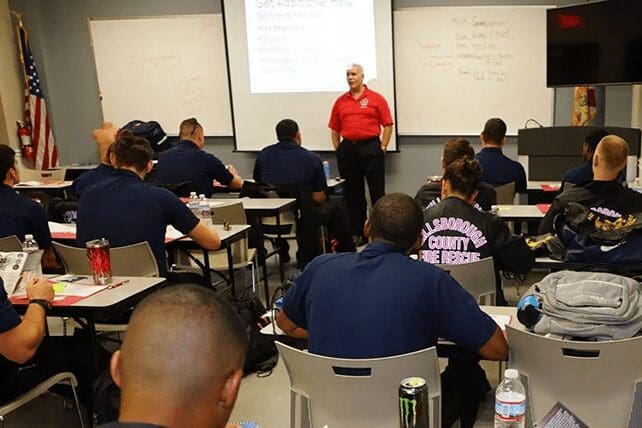PLANT CITY, Fla. (BP) – For families who don’t know, it’s tough to comprehend the stress of being a police officer.
Approaching a crime scene requires a double-awareness to identify it as real or an ambush. Often you may find yourself berated by the very people you’re trying to protect and serve. There is no “normal” day, as something like serving a warrant can turn deadly.
Dan Middlebrooks understands the stress that comes with the job.
After a 26-year military career, Middlebrooks served as a Southern Baptist-certified chaplain in multiple agencies around Plant City, Fla. From 2019-2022 he also was pastor of First Call Church in Dover, Fla., a congregation that places a significant focus on ministry to first responders. He is also the founder of Chaplaincy Care, which focuses on first responder agencies in Hillsborough County, Fla.
Attrition has always been an issue in law enforcement, but the struggle to keep officers has grown dramatically in recent years across the country. Although nonviolent crime decreased during the COVID-19 pandemic, the murder rate increased nearly 30 percent in 2020 with assaults going up 10 percent. A rise in crime has coincided with record numbers of officers leaving the job, even before collecting retirement.
Middlebrooks has seen it. He’s known officers who, after 20 years on the force, can either retire or work up to another five. During that period the amount for their retirement would be placed in a separate account even as they continued to draw their regular salary.
Many have said no thanks.
“They’d rather end with 20 strong [years] than lose their life in an environment where a community has largely turned against them,” he said.
“Right now, we’re seeing a lot of hurting souls in law enforcement and first responders. I’m working with men and women every day who are asking if it’s worth it. They feel that even when they do what is right, it’s seen as wrong.”
Sergeant Andrew Ivey, chaplain coordinator with the Metro Nashville Police Department, agrees that low morale is a crucial factor and used a variation of a familiar saying to make his point.
“It can be said ‘Don’t bite the hand that protects you.’ Unfortunately, that’s what many people are doing right now,” said Ivey, an officer for 15 years who has served in Christian ministry for more than two decades.
“Police officers are the ones who run into the gunfire when everyone else is running away. They are the ones who jump into the river to save a drunk, suicidal person.”
Ivey saw that for himself.
“I lost a fellow officer that way,” he said. “He literally jumped into a river, knowing he couldn’t swim, to save a drunk suicidal woman. He was able to save her before the river took his life.
“That is a hero.”
Even heroes need a moment, though, when emotions get high and the stress gets heavy. In those times chaplains help by serving as a resource but also as a model.
“Your role is to provide support,” said Ivey, who also served in the Marine Corps. Chaplains can’t directly proselytize, he explained, but their presence and words of encouragement naturally lead first responders to want to know the source.

